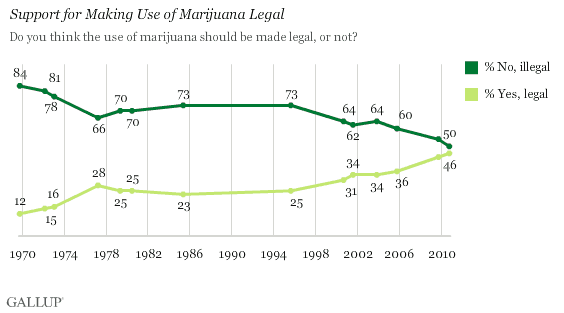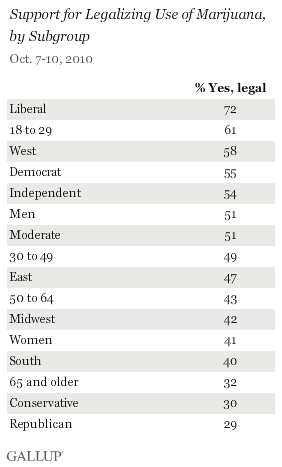WASHINGTON, D.C. -- While California's marijuana ballot initiative is garnering a lot of attention this election cycle, Gallup finds that nationally, a new high of 46% of Americans are in favor of legalizing use of the drug, and a new low of 50% are opposed. The increase in support this year from 44% in 2009 is not statistically significant, but is a continuation of the upward trend seen since 2000.

These results are from Gallup's annual Crime poll, conducted Oct. 7-10. Approximately 8 in 10 Americans were opposed to legalizing marijuana when Gallup began asking about it in the late 1960s and early 1970s. Support for legalizing the drug jumped to 31% in 2000 after holding in the 25% range from the late 1970s to the mid-1990s.
A separate question in the poll asked about legalizing marijuana for medical use, and found support significantly higher than it is for legalizing the use of marijuana in general. Seventy percent of Americans say they favor making marijuana legally available for doctors to prescribe in order to reduce pain and suffering. This figure is down, however, from 78% in 2005 and 75% in 2003.
Political Leanings, Age Divide Americans' Support for Legalizing Marijuana

Across numerous subgroups, liberals' support, at 72%, is by far the highest. There is widespread support for legalization among 18- to 29-year-olds (61%) as well.
Majority support is also found among Democrats, independents, men, and political moderates.
A large majority of those living in the West, which encompasses California, are in favor of making the drug legal. Support is significantly lower in the South and Midwest.
Political conservatives and Republicans are the least supportive of legalizing marijuana. Seniors express a similarly low level of support.
Women are 10 percentage points less likely than men to favor legalizing the drug.
These demographic, political, and ideological differences in support are much the same as they were in 2009.
Bottom Line
Arguments for and against legalizing marijuana -- for personal or medical use -- are likely to continue for years to come. Even if Proposition 19 wins in California on Nov. 2, as state law it will still come up against federal law, which bans the growth and sale of marijuana.
Support for making the drug legal in general, however, is growing among Americans. The public is almost evenly split this year, with 46% in favor and 50% opposed. If the trend of the past decade continues at a similar pace, majority support could be a reality within the next few years.
Survey Methods
Results for this Gallup poll are based on telephone interviews conducted Oct. 7-10, 2010, with a random sample of 1,025 adults, aged 18 and older, living in the continental U.S., selected using random-digit-dial sampling.
Each question reported here was asked of a half-sample of approximately 500 national adults.
For results based on these total samples of national adults, one can say with 95% confidence that the maximum margin of sampling error is ±5 percentage points.
Interviews are conducted with respondents on landline telephones (for respondents with a landline telephone) and cellular phones (for respondents who are cell phone-only). Each sample includes a minimum quota of 150 cell phone-only respondents and 850 landline respondents, with additional minimum quotas among landline respondents for gender within region. Landline respondents are chosen at random within each household on the basis of which member had the most recent birthday.
Samples are weighted by gender, age, race, education, region, and phone lines. Demographic weighting targets are based on the March 2009 Current Population Survey figures for the aged 18 and older non-institutionalized population living in continental U.S. telephone households. All reported margins of sampling error include the computed design effects for weighting and sample design.
In addition to sampling error, question wording and practical difficulties in conducting surveys can introduce error or bias into the findings of public opinion polls.
View methodology, full question results, and trend data.
For more details on Gallup's polling methodology, visit https://www.gallup.com/.
